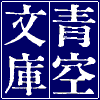| JAPAN 533: Modern Japanese Literature Seminar
The Golden Demon:
Ozaki Kôyô's Konjiki yasha
&
Oguri Fûyô's sequel, Konjiki yasha (shûhen)
Tuesdays 2:30-4:20pm and Fridays 2:30-6:00pm
Mary Gates Hall 297
Co-taught by Professor Rimbara Sumio (Kobe University)
and Professor Ted Mack (University of Washington)
|
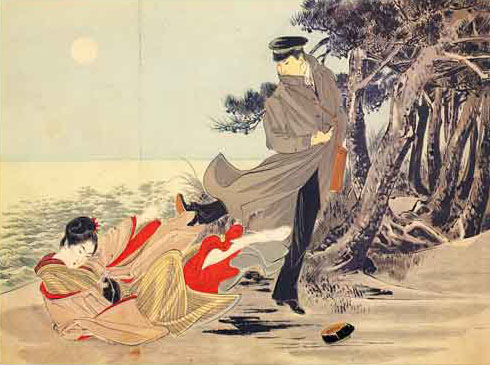
Frontispiece from the 1898 edition |
Konjiki yasha was serialized in the Yomiuri shinbun and the literary journal Shinshôsetsu between 1 January 1897 and March 1903. Along with Hototogisu, it was one of the two bestselling works of literature during the Meiji period (1868-1912).
It is our pleasure to have RIMBARA Sumio, professor of Japanese literature at Kobe University and visiting scholar at the University of Washington, co-teach this course. Professor Rimbara is the author and editor of many articles and books, most recently the volume on political novels (seiji shôsetsu) of the Shin Nihon koten bungaku taikei Meiji-hen (Tokyo: Iwanami Shoten, 2003), volume 16.
The class will be conducted in Japanese and therefore requires a very advanced level of Japanese speaking, listening, and reading ability. All writing will be done in English. Any student with sufficient language ability and interest, whether graduate or undergraduate, is welcome to contact us about taking the course. Course enrollment is limited and requires the permission of the professors. Please contact Professor Mack if you are interested in taking the course.
The main discussion meeting will be the Friday of each week. Class will begin at 2:30 and continue until no later than 6:00pm. Tuesday will be an optional session for more personalized assistance.
Tentative Reading Schedule
Frontispiece from the 1898 edition of Ozaki Kôyô's Konjiki yasha. |
|
|
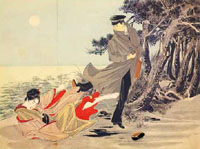 |
| 02 April |
Introduction |
| 09 April |
Ozaki Kôyô, Konjiki yasha (zenpen) [64 pages]
|
| 16 April |
Konjiki yasha (chûhen) [99 pages] |
| 23 April |
Konjiki yasha (kôhen) [80 pages] |
| 30 April |
Konjiki yasha (zokuhen) [99 pages] |
| 07 May |
Konjiki yasha (zokuzoku and shinzoku) [74 pages] |
| 14 May |
Oguri Fûyô, Konjiki yasha (shûhen, chs. 1-4) [134 pages] |
| 21 May |
Oguri Fûyô, Konjiki yasha (shûhen, chs. 5-8) [88 pages] |
| 28 May |
Oguri Fûyô, Konjiki yasha (shûhen, chs. 9-12) [81 pages] |
| 04 June |
Student paper presentations |
|
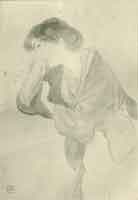 |
|
|
Frontispiece from the 1909 edition of Oguri Fûyô's Konjiki yasha (shûhen.) |
|
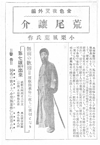 |
Additional Readings |
- Kitani Kimie, "'Konjiki yasha' no sekai" from Ozaki Kôyô no kenkyû (Tokyo: Sôbunsha, 1995), pp. 106-131.
|
- Kitani Kimie, "'Konjiki yasha' no kenkyûshi" from Ozaki Kôyô no kenkyû (Tokyo: Sôbunsha, 1995), pp. 1132-146.
|
- Marshall Berman, "Introduction" and "All That Is Solid Melts Into Air" from All That Is Solid Melts into Air (New York: Penguin, 1982), pp. 15-36 and 87-129.
|
- Peter Brooks, "The Melodramatic Imagination" from Imitations of Life (Detroit: Wayne State University Press, 1991), pp. 50-67.
|
- Anitra Nelson, "An Alienation Theory of Money" from Marx's Concept of Money (London: Routledge, 1999), pp. 5-22.
|
- Ben Singer, "Meanings of Modernity," "Meanings of Melodrama," and "Melodrama and the Consequences of Capitalism" from Melodrama and Modernity (New York: Columbia University Press, 2001), pp. 17-35, 37-58, and 131-148.
|
- Odaira Maiko, "Konjiki yasha: owaranai monogatari" from Ozaki Kôyô: 'Onna monogatari' o yominaosu (Tokyo: Nihon hôsô shuppan kyôkai, 1998), pp. 182-206.
|
- Mark Anderson,
"Male Anxiety and Female Desire in Ozaki Kôyô's The Gold Demon: Moral Capital in the Meiji Family State" (unpublished manuscript.)
|




